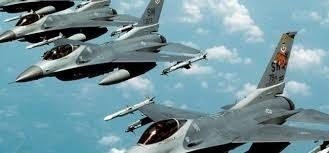As a result of its military intervention, Russia has now complicated the situation in Syria in an unprecedented manner. Moscow’s entry into the conflict is being conducted in full view of the entire world, and lacks any kind of convincing rationale whatsoever. Throughout the last four and half years of the Syrian conflict, Moscow has been insisting that its presence in Syria is limited only to providing the Assad regime with military advisers on the ground. However, Russia soon also began supporting the regime with military supplies. All the while, Moscow’s ally Bashar al-Assad has been incurring more losses than wins on the ground in the war, until the actual territories under his control shrunk to less than a quarter of Syria’s total landmass.
Russia’s recent decision to enter the conflict is motivated by the desire to protect Assad, and not just to fight the Islamic State (ISIS) and other extremist groups as Moscow is claiming. In fact—and here is the surprise—Russia’s air strikes have thus far targeted some of the moderate Syrian opposition as well as civilians, all in plain sight and in front of the entire world.
But does this almost Hollywood-style Russian intervention have an American director, so to speak? It is not possible to give a definitive answer here. Perhaps the coming days will help us determine whether Washington’s reaction to this development will match its publicly declared position, or whether we will have another “Ukraine scenario”—when the United States made an audible clamor of protestation which reverberated around the world but which did not yield any action from Washington whatsoever.
What I believe is more important right now is the position taken by the major Arab players on this latest move by Moscow—especially bearing in mind that it would not be possible in this case to rely on the Arab League, which lacks the necessary leverage to confront this complex situation at the international level. Egypt, for example, has made no secret of its support for the Russian airstrikes, which it sees as dovetailing with its current policies toward Syria. Since the Syrian conflict began, Cairo’s position has veered from stridently anti-Assad, to one of neutrality, to support for the regime under the pretext of safeguarding Syria’s remaining institutions. This seesawing surely counts as a black mark on Cairo’s foreign policy record, and is completely unbefitting for a country like Egypt.
Saudi Arabia, on the other hand, has been at the forefront of countries supporting the Syrian people against the regime of Bashar al-Assad. Riyadh has since the start of the conflict supported the moderate opposition—and its position has not changed throughout. It has always maintained that the unity of Syria and the continuity of its civil society and military institutions is absolutely paramount. Riyadh has also insisted on the formation of a transitional council to govern the affairs of the country that should not include Assad or anyone else whose hands are now tainted with the blood of the Syrian people.
We can compare this position with that of Turkey, which unlike Egypt and Saudi Arabia shares a border with Syria, and is a NATO member, advantages that allow Ankara—if indeed it has the appetite for this—to take immediate military action to intervene after the Russian entry into the conflict. The reality is, however, that the mere thought of a confrontation with Russia in Syria would be a kind of political suicide for Turkey. After all, if the United States and other major Western powers haven’t even contemplated the idea of a direct military confrontation, then how could such a move even be considered by a country like Turkey, which is no match for the likes of the US, Britain or France, whether in terms of military power or political clout?
Does this mean, then, that the world simply sits back and blithely watches while Russia enters the conflict? Of course not. We must bear in mind, however, that confronting Moscow—which has added ample fuel to already raging fires in Syria—should not make the situation any worse, bearing in mind that this has become a truly international conflict which shows no signs of abating. Leaving aside the recent meeting between Russian Foreign Minister Sergei Lavrov and US Secretary of State John Kerry, during which both sides agreed that they should not engage in any kind of military confrontation against each other in Syria, the only solution in my view is to create internationally recognized safe zones in the country. This would protect the Syrian people from the terrorism of the Assad regime on the one side, and that of ISIS on the other. At the same time, this move would put a lid on the wave of refugees reaching Europe—a situation that will be further excerbated as a result of Russian and Iranian intervention. These safe zones would therefore at least be able to provide a temporary solution that protects the Syrians from Russian strikes, and from other belligerents in the conflict, in light of the international community’s confusion regarding which factions in Syria they are classifying as terror groups. Such a move would also allow for the return of some 7 million Syrian refugees and migrants to the country and will provide them with a safe environment in which to live.
The ball is truly in the court of Washington and its allies. They can take practical steps to help curb Russian intervention in Syria by establishing such safe zones. This is the bare minimum which the United States—until recently the world’s foremost and only superpower—should take in order to save face regarding what remains of its international standing after its woeful inaction on Syria.


